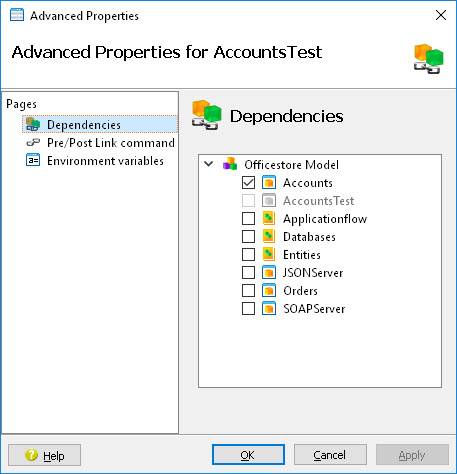Advanced Properties dialog
Use the Advanced Properties dialog to set dependencies between nodes, pre and post link and compile commands, and environment variables for nodes in a project.

| Page | Relevant Nodes | Usage |
|---|---|---|
| Dependencies |
Application Library |
A list of the available libraries and applications from the current project is displayed. See
Using external projects for further information. Select the check box for any library or application to include in the build. |
| Pre/Post Link command |
Application Library |
Shell scripts or other programs to be executed before or after linking. If the path to the script or program is not included in the system's PATH environment variable settings, then provide the complete path to the script or program. For example, if the script myscript is in /home/user/scripts, and this directory is included in the PATH environment variable of the system, enter myscript. Otherwise, enter /home/user/scripts/myscript. |
| Pre/Post Compile command | File | Shell scripts or other programs to be executed before or after compiling. If the path to the script or program is not included in the system's PATH environment variable settings, then provide the complete path to the script or program. For example, if the script myscript is in /home/user/scripts, and this directory is included in the PATH environment variable of the system, enter myscript. Otherwise, enter /home/user/scripts/myscript. |
| Environment variables |
Group Application Configuration Library |
Two sections comprise the Environment variables page: the User Variables section and the Environment section. The User Variables section, located at the top of the page, is where you define or redefine environment variables for the selected node and its descendants. For example, if you define an environment variable for an application node that contains two configuration nodes as children, the environment variable is set for both the application node and the two configuration nodes (unless it is overwritten at the configuration node level.) You can use Predefined node variables to specify the value of a variable.The Environment section, located under the User Variable section, lists the environment variables and their settings for the currently selected node, based on the settings of the system, the configuration, and as defined on the Variables tab for the selected language build rules. You can use the filter variables field to filter which variables display. The environment variables cannot be altered from this list. To change the value for a variable,
re-define the variable in the User Variable
section. Any changes made in the User
Variable section is reflected in the
Environment section. Tip:
Environment variables can also be modified by setting Genero Configuration Environment Sets. It is recommended that you set your Genero environment variables using environment sets. For more information, see Environment sets. To learn more about the role of a specific Genero environment variable, see Genero environment variables in the Genero Business Development Language User Guide. |